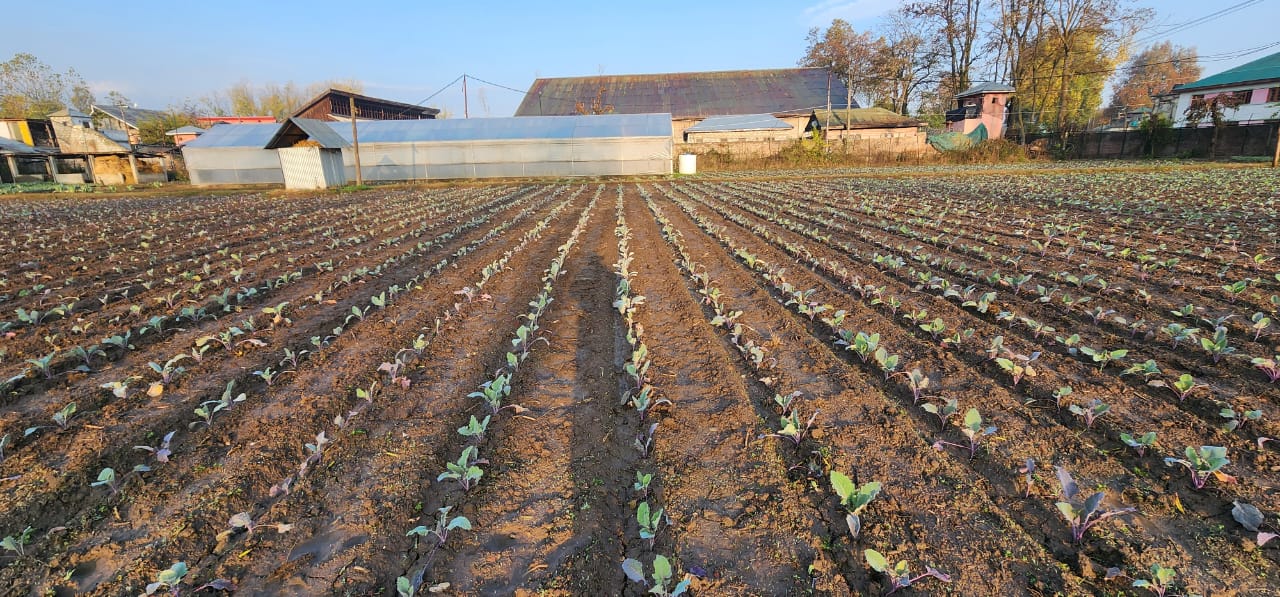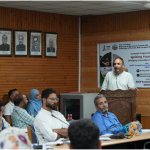Srinagar, Nov 21: Farmers in Sumbal town of north Kashmir’s Bandipora district are reaping benefits and improving their crop production due to seedlings taken from Seed Multiplication Farm (SMF).
Mehraj-ud-Din Beigh, a farmer from Ganastan village of Sumbal, said he has been taking seedlings from the farm like onion, tomato, brinjal, and capsicum which has helped him to improve his agricultural produce.
“Earlier, we used to produce seedlings on our farm and we did not get the expected results and the seedlings were also not of good quality. The farm provides hybrid seedlings which have transformed the agriculture of the area. Now, we have doubled our produce,” Beigh told Rising Kashmir.
Over the past two years, the farmer grows different kinds of vegetables and sells the produce to Parimpora Fruit Mandi in Srinagar.
Another farmer Mudasir Ahmad said that for the last two years, he has been taking the seedlings from the farm which has improved his produce.
“The onion seedlings taken from this farm produce a double crop than the traditional type of seedlings which we would prepare at home. The crop of hybrid seedlings has good shelf life especially when it is onion,” he said.
Mudasir has been growing vegetables over the past several years. He stopped growing seedlings at home when he came to know about the seed multiplication farm. “People should seize the opportunity and take the seedlings from this farm if they want to get more produce,” the 35-year-old farmer said.
Farm Manager, Tabasum Majid Hurrah said the government seed multiplication farm spread over 8 kanals of land produces hybrid seedlings that are given to farmers and seeds are taken to the department. High-tech poly houses are used for producing seedlings.
“We give farmers quality seedlings and ensure that the seedlings are hybrid. Once there is good seed, the farmer production increases and it increases their income,” he said.
The farm produces both kharif and rabi seeds as per the cropping plans of the agriculture department. The seeds are sowed, harvested, washed, dried and then go to the farmers through the divisional agriculture department.
“In India, agriculture is the backbone of the economy and seed farms are the backbone of this sector. When there is quality seed it is for the benefit of farmers,” he said.
The farm aims to produce quality seeds and seedlings for farmers. “In this area, there is a good demand for onion seedlings, brinjal, tomatoes, chillies, Knol Khol, etc.,” he said.
The farm provides seeds and seedlings to farmers at subsidised rates. They directly visit the farmer. Preference is given to farmers of surrounding villages.
Many progressive farmers from outside Jammu and Kashmir including from Ladakh visit there to know the best practices that are followed on the farm.
“The main aim is to motivate and inspire farmers through the productive techniques that are being applied for better farming and for better results. Even students come to the farm to learn different kinds of modern farming practices,” he said.
Director Agriculture Kashmir, Chowdhury Mohammad Iqbal, who recently visited the farm, said over the past two years, the departmental farms are undergoing a major transformation and one such example is the Sumbal farm.
“These farms have to play a bigger role in coming days in catering to the demand of farmers for seeds besides work as model centres for the cultivation of agricultural crops,” he said.
The director said that due to climate change, the decline in land resources and agriculture operations needs to be strategically diversified so that the impact could be minimised.
“Vegetable farming is susceptible to losses. Better knowledge about vegetable cultivation and availability of quality inputs i.e. plant material, seed can significantly enable farmers to undertake informed decisions and reap better profits,” he said.
Sumbal farmers reap benefits of seed multiplication farm

Leave a Comment
Leave a Comment







